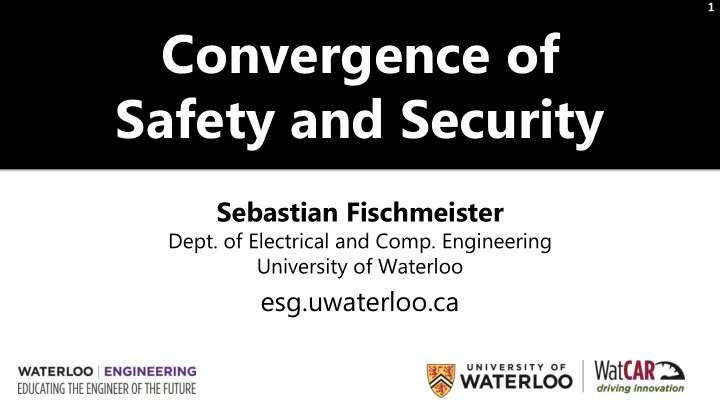

1 Convergence of Safety and Security Sebastian Fischmeister Dept. of Electrical and Comp. Engineering University of Waterloo esg.uwaterloo.ca
2 Research area: Safety and security of software- intensive embedded safety- critical systems
3 Prof. Fischmeister 1. Security of mobile code systems (1999-2001) 2. Embedded and safety-critical systems (2002-now) • Static analysis and instrumentation 3. Data extraction • Dynamic binary instrumentation (2008-now) • Side-channel analysis • Runtime verification, monitoring 4. Data analysis • Anomaly detection, intrusion detection (2011-now) • Reverse engineering Applied to: Safety-critical systems • Exec. Director WatCAR • Consulting for ISO 26262 • Member of SCC TC56
4 Observation: Modern systems are beyond deep comprehension of human minds
5 Systems Are Complex Picture of car
6 Code Complexity is Increasing
7 We Cannot Comprehend Digital Systems System size and Nobody would try building that bridge; complexity are the unless it was software only! challenge! => Humans are bad at judging logical complexity Illustrating one example: Bridge from Tokyo to Vancouver
9 Observation: Safety deals with the universe Security deals with people
10 Safety: Security: The sun flips bits by chance. Attacker flips bits on purpose.
11 Safe but not secure Millions of people are driving this vehicle …
12 Secure but not safe … but nobody would drive this car. (except Colin Furze)
13 Observation: Safety is static Security is dynamic
14 Safety Following ISO 26262 Recommended lifecycle leading to a safe product.
15 Once a Safe Product … Always Safe*
16 More Vulnerabilities Every Year 137,729 (Dec ‘18) In last 10 years: • 206 per week • 1.2 per hour (!)
17 Once a Secure Product … Not Secure Tomorrow!
18 News of the Day
19 Observation: Security operates at a different speed than product development
20 Passenger aircraft 10 years 5 years Vehicle 1 year Smart phone Flashy IoT thingy 1 week 137,729+ CVE entries? (206 per week)
21 RELATION TO DEFENCE SYSTEMS
Weapon Systems Spending $1.66 Trillion $25.5 Billion
23 Cyber attacks have the potential to take control of or shutdown any of these systems that are dependent on software. Ref. US Government Accountability Office – Report t U.S. Senate, Weapons Systems Cybersecurity - 9 October 2018
“This … herald[s] the coming rise of strategic cyberwarfare as a means of striking in very costly, disruptive ways at an adversary without a prior need to defeat opposing military forces in the field, at sea, or in the air.” John Arquilla, The Rise of Strategic Cyberwar, U.S. Naval Postgraduate School
25 An estimated 15% of spare and replacement parts for DoD equipment are counterfeit. Toohey , Brian. “Counterfeit Semiconductors – A Clear and Present Threat.” Testimony Before Senate Committee on Armed Services, Counterfeit Electronic Parts in the U.S. Military Supply Chain, November 8, 2011.
26 CHALLENGES: AN INCOMPLETE, BIASED SELECTION
27 Challenge: How to assist engineers to understand modern systems?
28 Challenge: How to provide effective protection of cyberphysical systems?
29 Challenge: How to maintain 30-year old systems?
30 Challenge: How to holistically address safety and security? +100% more AI inside now
31 EXAMPLE RESULTS OF COLLABORATING WITH THE UNIVERSITY OF WATERLOO
Palisade: Cyberphysical Mission Assurance Attack Detector – Detect crafted attacks Attack Capture – Capture&store adversary attacks Attack Counter – React to detected attacks Multiplicative security controls – Heterogeneous design to maximize resilience A scalable, retrofittable solution for surviving crafted cyberphysical attacks
Palisade Test: Hexacopter Drone Detected control disruption, denial-of-service, reverse engineering attacks Public test
Palisade Test: Vehicle Body Control Module Detected buffer overflow, arc injection attacks Public test
Palisade Test: Autonomous Driving AI Detected GPS spoofing, steering hijack, man-in-the-middle attacks Public test
Palisade Test: Autonomous Vehicles Detected gear-shift & control state irregularities Public test
Palisade Test: Military Platform Detected gear-shift & control state Detected various attacks and irregularities induced anomalies Released photos Public test
Conclusions • Systems are becoming too complex for humans to comprehend • Computerization of systems will continue to happen • We need to identify methods and technology for building safe and secure systems • Be prepared as change can come practically over night!
39 Contact info: Sebastian Fischmeister sfischme@uwaterloo.ca Dept. of Electrical and Computer Eng. University of Waterloo 200 University Ave West Waterloo, ON N2L 3G1
Recommend
More recommend